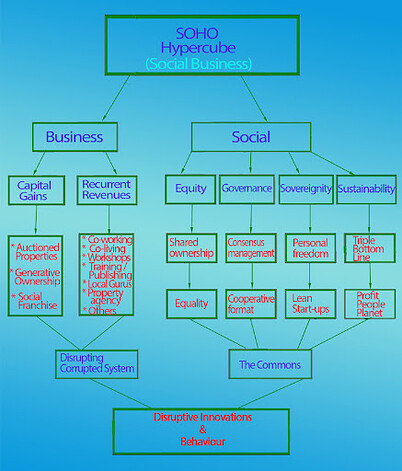Thanks for moving the conversation this way, Katherine.
I think a lot of people here will resonate with the situation you described.
To your question: The are some good ideas out there. I personally am a fan of approaches that de-emphasize the office space side of things and increase emphasis on using the space as a meeting and gathering space. (Quick example: http://lmhq.nyc)
But before we get too deep into the details of the What, I’m thinking we need as much as ever now to examine the Why.
When coworking started, there was only the Why. We didn’t even have a What yet, and it certainly wasn’t an industry!
Now, 11+ years later, the Why has been largely obscured by so much talk about the What. The real estate. The tech. The mechanisms.
Let’s take what’s happening to its logical extension and assume that, to Miroslav’s point, coworking space is as ubiquitous and available as WordPress or, to Alex’s point, a Big Mac.
Great! Anyone anywhere (in a developed nation, anyway) can build a free blog in a shared space while eating a cheeseburger.
So what? What next?
A cheap cheeseburger is food, but what is nutrition?
Taking these things to their maximum extensions is valuable because it lets us shift from focusing on availability to focusing on mastery.
We’re in a time of great opportunity, but also great uncertainty. There is much work to be done to steer us as a society away from dystopia and towards peace and prosperity.
A lot of us got into coworking because we saw it as a way of moving us in that better direction, and it is. The day-to-day of operating a space can be an enormous distraction, and in many cases the business model is not complete.
Which is why I think it’s critical that we all work on getting in touch with why we care about doing this work in the first place.
Go back to that for a while, and really let that percolate, I think the next steps for each of us and for us as a movement start to become clear.
I can tell you what I see, but it doesn’t matter what I see. What do you see?
Tony
···
—
New Work Cities • Coworking.org




On Jan 13, 2017, at 6:17 AM, Katherine Warman Kern [email protected] wrote:
It would be so interesting if this thread were more exploratory.
There is a disconnect between vision [everyone collaborating to build their business and grow the overall market] and reality [everyone is so busy putting out fires on the surface - essentially madly treading water - that they don’t have time to get to know others well enough to do business together or figure out a business model in which independent entities collaborate]
Real estate companies see what they want to see: higher revenues per square foot than they can get with long term leases. They are creating a commodity market with words-as-window-dressing: “collaboration, innovation, community, create.” Right now they are all racing to be the first IPO. Then there will be a race to the bottom of the pricing ladder. The only folks who will make money are the dealmakers. But that’s their problem.
The rest of us should focus on how we breakdown the barriers to independents collaborating - including us. I think that starts with inventing a new business model. Any ideas?
K-
You received this message because you are subscribed to the Google Groups “Coworking” group.
To unsubscribe from this group and stop receiving emails from it, send an email to [email protected].
For more options, visit https://groups.google.com/d/optout.

